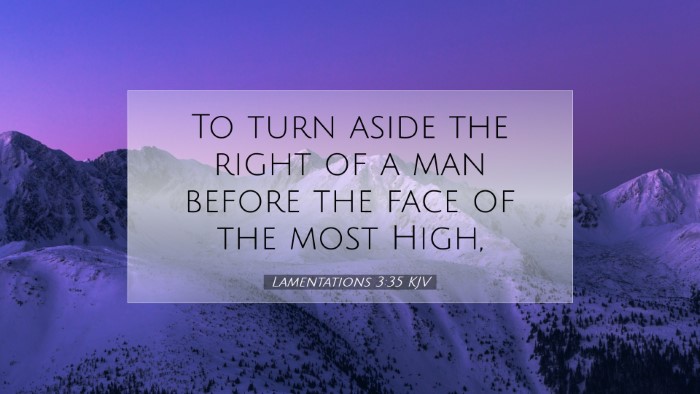Lamentations 3:35 - Commentary and Insights
Lamentations 3:35 states, "To crush under one’s feet all the prisoners of the earth." This verse presents a complex interplay of divine justice and human suffering, reflecting on the themes of authority, injustice, and the character of God. The context of Lamentations—written as a mournful reflection on the destruction of Jerusalem—provides critical background to understanding the weight of this statement.
Contextual Overview
The book of Lamentations is traditionally attributed to the prophet Jeremiah. It expresses profound sorrow over the fate of Jerusalem after its fall to Babylon. This chapter particularly captures deep lament and reflection on the suffering of the Israelites. The sorrowful tone underscores the gravity of the nation's sin and the resultant suffering.
Theological Implications
In examining Lamentations 3:35, we must consider the underlying notions of divine justice. Here, the scripture signals that there is an expectation for justice to prevail in a world marred by oppression and suffering.
- Divine Justice: Matthew Henry emphasizes that the Lord does not overlook the injustices inflicted upon His children. The notion of crushing prisoners speaks of the ultimate authority God holds over human actions and the moral order.
- Human Suffering: Adam Clarke highlights that this passage reflects deep anguish and the direct consequences of sin within society. Clarke points out that the verse serves to remind the faithful that God is aware of their plight and holds a covenantal responsibility to deliver justice.
- God’s Sovereignty: Albert Barnes notes that the ability to enact justice is inherently God’s, and this verse serves as a chilling reminder of how those in power can misuse their authority. The crushing of prisoners serves as a metaphor for oppression and tyranny, underscoring that God is ultimately sovereign over all actions.
Interpretive Challenges
One of the challenges in interpreting Lamentations 3:35 lies in the implications for understanding God's character in light of human suffering. Critics might argue that God appears indifferent to the plight of the oppressed. However, many scholars argue that this verse rather speaks to an anticipatory hope for justice that will indeed come from God.
- Understanding God’s Delays: Matthew Henry posits that while God may not respond immediately, His sense of justice will ultimately prevail. Believers are called to maintain hope even amidst dire circumstances.
- Pleading For Justice: This verse can be viewed as a cry for vindication not only for the oppressed but also as a reminder of God’s nature as a defender of the weak. Both Clarke and Barnes agree that the verse should evoke a prayerful response from those who witness injustice.
- Hope Amidst Despair: The surrounding verses offer a counterbalance to the despair conveyed in this assertion. Believers are reminded to hope in God's mercy and faithfulness, particularly in emotionally charged texts like this.
Pastoral Application
In a pastoral setting, Lamentations 3:35 can be used effectively to address issues of injustice and suffering. Pastors can remind congregants that God sees the injustices they experience and will ultimately rectify them according to His righteousness.
- Advocacy for the Oppressed: Pastors can encourage their congregations to advocate for social justice, drawing inspiration from biblical texts that call for the protection of the marginalized.
- Comfort in Suffering: This passage can serve as a source of comfort for those in pain, reinforcing that God understands their suffering and is aware of their cries for help.
- Encouragement to Pray: Encouraging an active prayer life centered around social issues can be a practical step stemming from this verse. Members can be urged to intercede for those wrongfully imprisoned or oppressed.
Conclusion
Lamentations 3:35 serves as a powerful reminder of the complexities surrounding divine justice and human suffering. By fusing insights from Matthew Henry, Albert Barnes, and Adam Clarke, we gain a multidimensional perspective on the text. It calls the faithful to deepen their understanding of God's righteous nature, to seek justice within their communities, and to hold fast to hope in times of trial.
In essence, this scripture transcends its historical setting, offering profound relevance in contemporary discussions about justice, authority, and the faithful response to suffering.


